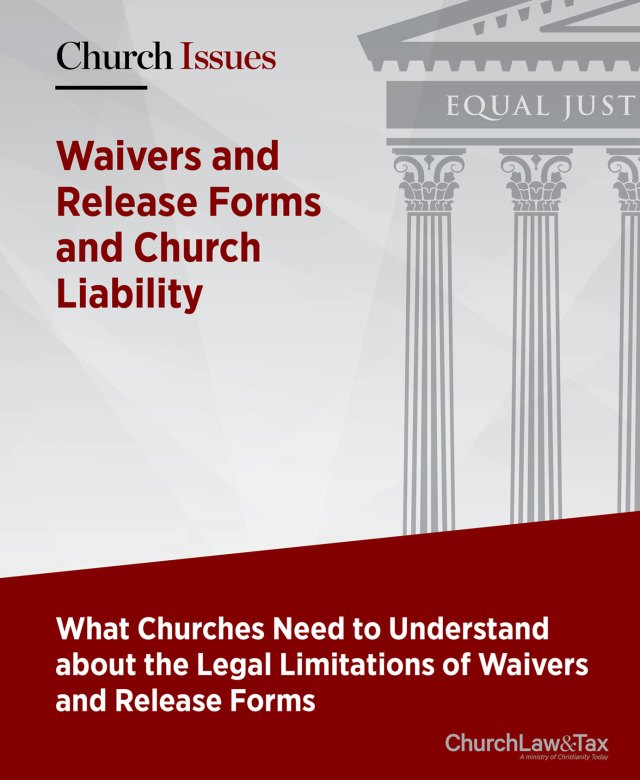Editor’s note: This article has a companion article, “A 16-Point Evaluation for Assumption of Risk Forms.”
Key point 10-16.06. A release form is a document signed by a competent adult that purports to relieve a church from liability for its own negligence. Such forms may be legally enforceable if they are clearly written and identify the conduct that is being released. However, the courts look with disfavor on release forms, and this has led to several limitations, including the following: (1) release forms will be strictly and narrowly construed against the church; (2) release forms cannot relieve a church of liability for injuries to minors, since minors have no legal capacity to sign such forms and their parents’ signature does not prevent minors from bringing their own personal injury claim after they reach age 18; (3) some courts refuse to enforce any release form that attempts to avoid liability for personal injuries on the ground that such forms violate public policy; and (4) release forms will not be enforced unless they clearly communicate that they are releasing the church from liability for its negligence.
Overview: Why Churches Use Release Forms
Churches, schools, and youth-serving ministries often ask event participants to sign forms intended to protect the organization from liability for injuries caused by its own negligence. These are commonly called:
- Release forms
- Waivers of liability
- Assumptions of risk
Many organizations use forms they find online without legal review—a risky move that can render the forms ineffective or even unenforceable.
Key Points Church Leaders Must Understand
- What release forms are and how they work
- Legal requirements for enforceability
- State law differences
- Why some forms are rejected by courts
- Special considerations for minors
- The role of indemnification and hold harmless clauses
- How release forms impact insurance and risk management
This article explains each point and summarizes leading court cases involving churches and charitable organizations.
Definitions and Purposes of Release Forms
A release form is an agreement where one party releases another from liability. It can be:
- Retroactive – Often used in legal settlements
- Prospective – Used before an activity to waive future claims (most common for churches)
Waiver is a legal term for giving up a known right.
Assumption of Risk means a person voluntarily accepts the risk of harm from a known danger.
“Assumption of risk means that the plaintiff, in advance, has given his express consent to relieve the defendant of an obligation of conduct toward him.” —Cohen v. Five Brooks Stable (Cal. App. 2008)
“The main purpose of a release typically is the voluntary relinquishment of a claim or right.” —Penunuri v. Sundance Partners (Utah App. 2011)
Most release forms combine release and assumption of risk language.
Types of Assumption of Risk
- Express: The participant signs an agreement.
- Implied: The participant knows the risk but proceeds anyway.
“Express assumption occurs when parties agree in advance that one of them is under no obligation to use reasonable care.” —Scott v. Pacific West Mountain Resort (Wash. 1992)
Note: In many states, implied assumption of risk has merged with comparative negligence laws.
Exculpatory Clauses: These are sections of a contract that aim to relieve a party of legal blame. The term comes from “exculpate,” meaning to free from blame.
Why Legal Counsel Matters
Using generic or out-of-state templates can lead to serious problems. For example:
In Hayward v. Trinity Church (M.D. Tenn. 2015), a church used a California-based agreement with a venue clause requiring arbitration in California. The court noted this was inappropriate for a Tennessee church and enforceability was compromised.
Always consult an attorney to ensure your release forms comply with local laws and context.
What Makes a Release Form Legally Valid?
To be enforceable, a release form must meet standard contract requirements:
1. Two or More Parties
- Typically between the church and participant.
2. Consideration
- Something of value must be exchanged.
Example: Valid Consideration
“In consideration of participating in [event], I release the church from liability.”
Example: Invalid Consideration
“I release the college from liability.” —No benefit is offered in return.
Courts do not assess the amount of consideration. Even a “peppercorn” is enough. —Mandel v. Liebman (N.Y. 1951)
3. Definiteness
- Terms must be clear and understandable.
4. Legal Capacity
- Parties must be mentally capable and at least 18 years old.
5. Mutual Assent
- Must be a “meeting of the minds.”
- Cannot be obtained through fraud, mistake, undue influence, or coercion.
6. Legality
- The agreement must not violate public policy or seek to excuse gross negligence.
Why Some Release Forms Fail
Courts may invalidate release forms for:
- Gross negligence or intentional acts
- Lack of consideration
- Ambiguity
- Unequal bargaining power
- Violating public policy
- Unconscionability (overly harsh terms or hidden clauses)
“The law does not favor exculpatory agreements because they encourage a lack of care.” —Walters v. YMCA (N.J. App. 2014)
Special Issues with Minors
Most states do not allow:
- Minors to sign enforceable contracts
- Parents to waive a child’s future injury claims
“The strong policy in favor of protecting children must trump any competing interest.” —Galloway v. State (Iowa 2010)
A few states have laws allowing parental waivers, but often only for specific activities (e.g., skiing, equine events) and with limits.
Practical Implications for Churches
Church leaders should:
- Always consult legal counsel when creating or using release forms
- Avoid relying on templates without state-specific review
- Be aware that gross negligence cannot be waived
- Understand that forms signed by or on behalf of minors may be unenforceable
- Use clear, unambiguous language in all documents
Risk management tip: Even with a valid release form, insurance coverage may still be affected by how courts interpret liability.
Conclusion
Release forms are useful risk management tools, but they come with strict legal standards. Courts scrutinize them carefully, especially when they attempt to waive claims involving minors or gross negligence.
Churches that understand these legal nuances—and craft their forms accordingly—can reduce risk and better protect themselves legally.
State Statutes Allowing Parents to Sign Preinjury Releases on Behalf of Their Minor Children
Note: Do not rely on this information without first consulting with legal counsel.
| State | Statute | Text of Statute |
| Alaska | AK Stat. 09.65.292 | (a) Except as provided in (b) of this section, a parent may, on behalf of the parent’s child, release or waive the child’s prospective claim for negligence against the provider of a sports or recreational activity in which the child participates to the extent that the activities to which the waiver applies are clearly and conspicuously set out in the written waiver and to the extent the waiver is otherwise valid. The release or waiver must be in writing and shall be signed by the child’s parent. (b) A parent may not release or waive a child’s prospective claim against a provider of a sports or recreational activity for reckless or intentional misconduct. |
| AK Stat. 05.45.120 | A ski area operator may not require a skier to sign an agreement releasing the ski area operator from liability in exchange for the right to ride a ski area tramway and ski in the ski area. A release that violates this subsection is void and may not be enforced. | |
| Arizona | AZ Stat. 12-553 | A. An equine owner or an agent of an equine owner who regardless of consideration allows another person to take control of an equine is not liable for an injury to or the death of the person if … the person or the parent or legal guardian of the person if the person is under eighteen years of age has signed a release before taking control of the equine. B. Subsection A does not apply to an equine owner or agent of the equine owner who is grossly negligent or commits willful, wanton or intentional acts or omissions. |
| Colorado | CO Stat. 13-22-107 | A parent of a child may, on behalf of the child, release or waive the child’s prospective claim for negligence. Nothing in this section shall be construed to permit a parent acting on behalf of his or her child to waive the child’s prospective claim against a person or entity for a willful and wanton act or omission, a reckless act or omission, or a grossly negligent act or omission. |
| Florida | FL Stat. 744.301(3) | Nothing in this subsection limits the ability of natural guardians [includes parents] on behalf of any of their minor children, to waive and release, in advance, any claim or cause of action against a noncommercial activity provider, or its owners, affiliates, employees, or agents, to the extent authorized by common law. |
| Virginia | VA Stat. 3.2-6202 | No participant or parent or guardian of a participant who has knowingly executed a waiver of his rights to sue or agrees to assume all risks specifically enumerated under this subsection may maintain an action against or recover from an equine activity sponsor or an equine professional for an injury to or the death of a participant engaged in an equine activity. The waiver shall give notice to the participant of the intrinsic dangers of equine activities. The waiver shall remain valid unless expressly revoked in writing by the participant or parent or guardian of a minor. |





